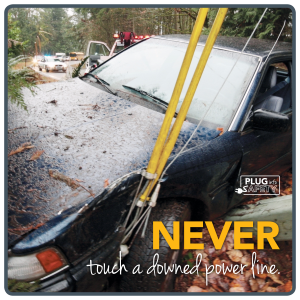 For an inexperienced teenaged driver, wrecking the family car is almost a rite of passage. The only way for young drivers to gain experience is by getting behind the wheel and putting miles behind them.
For an inexperienced teenaged driver, wrecking the family car is almost a rite of passage. The only way for young drivers to gain experience is by getting behind the wheel and putting miles behind them.
Some dangers, though, cannot be learned from personal “experience.” Take this example: an accident involving a utility pole. How the driver and passengers handle themselves in those moments after the car comes to a stop may mean the difference between life and death.
“Stay in the car, stay in the car, stay in the car!” is the mantra Indiana Electric Cooperatives wants young drivers to remember.
“Whenever a power line is involved, even a minor accident can become tragic,” said Tom VanParis, CEO of Indiana Electric Cooperatives. “Staying put for all involved, and warning passersby to stay away, too, cannot be stressed enough. Only after a first responder arrives on scene and says it’s OK, should you get out.”
Staying put may go against a driver’s first inclination; you want to get out and check the car and see if everyone around is OK. Teenagers, especially, might fret that “dad is going to kill me!” But stepping out of the car immediately after striking a utility pole may KILL YOU — for real. Here’s why:
- Power lines fall. When a pole is struck, power lines and hardware can break loose from their insulated perches atop the pole.
- Fallen power lines can still be energized. Even touching the ground, power lines can still be carrying 7,200 volts or more. They may not spark or buzz.
- Power lines are not insulated. Unlike the power cords on appliances we use, overhead power lines are bare strands of metal wire. This means grabbing them, grazing up against one or touching something that’s touching them can kill you.
- Fallen power lines are hard to see. Up on poles, silhouetted against the sky or glistening in sunlight, power lines may seem easy to see. But when knocked down and twisted with a tall grass or trees as a background, especially at night, power lines are almost impossible to see.
- Electricity seeks the quickest path to ground. If you get out of the car and touch a live power line and the ground, you become that path.
- If you are alive, you are safe. Immediately after a collision with a utility pole, you may not know if power lines have broken loose and are on your car. If you are alive, you are not that deadly “path to ground.” If you were part of that electrical path, you’d be dead since electricity essentially travels at the speed of light. But fallen power lines might be touching and energizing your car or the ground near you. If they are, and you step out onto the ground, the electricity flowing through your car will go through you to the ground.
- Call 9-1-1. After hitting a pole, call 9-1-1. Tell them you hit a pole. And wait patiently. Tell passersby to stay back. Wait till you know it’s safe before exiting.
There will be time then to inspect the damage. And mom and dad will be happier to hear about it from your lips — than from the coroner or a police officer.




